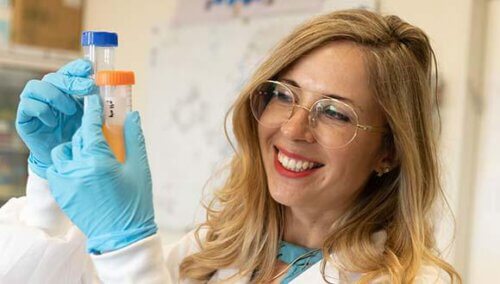In a study led by Dr. Natalia Freund and PhD student Abia Watson, the researchers were able to isolate antibodies from the body of a person who had tuberculosis and a healthy person and which can inhibit the growth of tuberculosis bacteria in laboratory mice

Over the past hundred years, antibiotics have been the main treatment against bacteria. The antibiotic is a chemical substance, which is not naturally found in the human body, and its purpose is to kill specific cells, such as bacterial cells. However, because bacterial cells and human cells share many biological mechanisms, there is a limit to the range of antibiotics that can be used without harming patients. For example, the mechanism of building the cell envelope of many bacteria is shared by many other cells, such as human cells and cancer cells, and damage to it will result in damage to all body systems and not just the bacterial cells. In addition to this, in recent years there is an increasing number of strains that are resistant to existing antibiotics, which puts us in front of the reality where we will find ourselves without an effective antibiotic that can deal with the bacteria without fatally harming the patient.
Dr. Natalia Freund's laboratory team From the Sackler Faculty of Medicine In recent years, a biological alternative to the known antibiotics has been tested. Antibodies are proteins that are naturally formed in the human body as part of a normal immune response. Today, antibodies are widely used in the clinic to treat cancer and autoimmune diseases.
In a new and groundbreaking study led by Dr. Natalia Freund and PhD student Abia Watson, the researchers were able to isolate antibodies that can inhibit the growth of tuberculosis bacteria in laboratory mice. The antibodies were isolated from a person who was infected and recovered from tuberculosis. This is actually the first time in the world that researchers have succeeded in developing "biological antibiotics" and proving that the use of antibodies of human origin can be an alternative to the usual chemical antibiotics. The research was done in collaboration with laboratories in the USA and China and was published in the prestigious scientific journal Nature Communications.
Tuberculosis as a case study
The researchers took tuberculosis, which is a disease caused by the bacterium Mycobacterium tuberculosis, as a case study and succeeded, for the first time, in creating an effective antibody-based treatment for a bacterial disease. They chose tuberculosis, because although the vaccine for tuberculosis was developed already 100 years ago, it is not effective in adults and does not prevent infection. In addition, recently more and more resistant disease strains are developing against which the only current treatment, the antibiotic treatment, is not effective. Since these are highly contagious bacteria that are transmitted through the air and damage the lungs, the spread of resistant tuberculosis strains that have no treatment is a real danger. Today, about a quarter of the world's population is infected with tuberculosis, of which about 200 are active patients every year in Israel.
"The development of molecular medicine allows us to defeat the bacteria in new ways that are not based on chemical substances, and also constitute a solution for dealing with resistant bacteria," says Dr. Natalia Freund. "For the past 80 years, our only weapon against bacteria has been antibiotics, which unfortunately are becoming less effective. The bacteria show resistance to a considerable proportion of the antibiotics, and because of this, in many cases the doctors find it difficult to adapt the medicine to the disease. Our study is the first proof of feasibility that the use of monoclonal antibodies can be an effective alternative in the fight against bacterial pathogens," notes Dr. Freund.
Blocking the activity of the phosphorus pump in the bacterial envelope
It should be noted that until now, due to the size and complexity of the tuberculosis bacterium, efforts to isolate monoclonal antibodies against it have not yielded fruit. But now, the researchers in Dr. Freund's laboratory were able to focus on a phosphorus pump in the bacterial envelope, which is used to supply energy to the cell after infection, and to isolate two types of antibodies against the pump, which block its activity.
Dr. Natalia Freund and the laboratory team
The researchers found that passive vaccination of each of the antibodies in mice resulted in a reduction of the bacterial load by 50% compared to mice that did not receive the vaccine. In addition, these antibodies were found to be effective against three different strains of the tuberculosis bacterium, and since the element against which the antibodies were developed, the phosphorus pump, is evolutionary conserved, the vaccine is expected to be effective against many other strains as well, including resistant strains.
Now, after the success of the research, Dr. Freund's laboratory is examining the possibility of expanding the "biological" alternatives to antibiotics to other diseases as well. "The model we proved in the research will allow us to expand our activity in the future to diseases such as ophthalmitis and staphylococcal infections." says Dr. Natalia Freund.
More of the topic in Hayadan:
